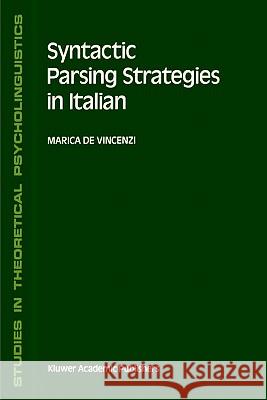Syntactic Parsing Strategies in Italian: The Minimal Chain Principle » książka
Syntactic Parsing Strategies in Italian: The Minimal Chain Principle
ISBN-13: 9780792312758 / Angielski / Miękka / 1991 / 223 str.
The basic accomplishment of sentence processing research in the 1960s and 70s was to establish that perceivers assign structural representa tions to sentences (Fodor et al., 1974) and they do so systematically using the formation rules of the grammar (Forster, 1979). This may sound like a singularly unimpressive accomplishment to a contem porary linguist - mere proof of the obvious. But one must recall the extremely impoverished view of language and language processing prevalent in the U.S. in the 1950s. Processing mechanisms were thought to consist of slightly elaborated stimulus-response associations, and sentences were viewed as mere strings of concatenated words. On this view, understanding language comprehension was naturally equated with knowing how words and associations between them were learned. Consequently, language pro cessing was investigated by performing a seemingly endless series of tedious paired associate learning studies. The shift in the 1960s to a view of sentences emphasizing hierarchically organized structures con taining grammatical depencies between widely separated items was thus dramatic.











